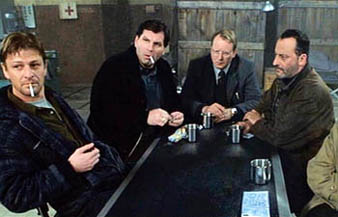Viking Night: Ronin
By Bruce Hall
November 19, 2013
BoxOfficeProphets.com

Ronin also contains the greatest car chase ever put to film. Also, like most good heist flicks there is an obvious MacGuffin driving the plot. And of course, there are samurai. Sort of.
The title – Ronin – is a Japanese term for what is basically an unemployed warrior. Back in the day, if a samurai’s master fell or released him, there was no such thing as food stamps. A brother had to wander the land a disgraced mercenary, looking for work anywhere it could be found. The best example might be the legend of the 47 Ronin, who avenged the loss of their master by an unscrupulous rival. Afterward, they committed ritual suicide on the guy’s front lawn because A) it was considered a badass thing to do at the time, and B) toilet papering the trees was not an option, because it hadn’t been invented yet.
The question posed by this movie is whether or not the disgraced can really find redemption through sacrifice, and whether embracing that sacrifice can make you your own master.
The answer begins to take shape as group of mercenaries come together at a pub in France, in a brooding, rain slicked scene right out of a '40s noir thriller. There’s Sam (Robert De Niro), a grizzled former spook who’s in the habit of seeing enemies everywhere and stashing a pistol outside every building he walks into. There’s Vincent (Jean Reno), an avuncular Frenchman who dispenses astute philosophical advice as easily as he pumps bullets into communists. Larry (Skipp Sudduth) is the wheelman, Gregor (Stellan Skarsgard) is the requisite techno-nerd, and Spence (Sean Bean) is the trigger happy whacko who makes you wonder whether there might have been some gaps in the interview process.
And of course there’s their handler, a beautiful Irish woman named Deirdre (Natascha McElhone), who looks and acts like someone carved her out of a 10,000 year old block of ice. She in turn, answers to Seamus O’Rourke (Jonathan Pryce), an oily IRA radical whose mysterious designs are the reason all these people are together. The mission is to retrieve a mysterious briefcase from a heavily armed convoy of anonymous goons. Deirdre doesn’t provide a lot of details (like what’s in the case, why Seamus wants it and who the aforementioned goons are) but she offers solid pay, room and board, and all the icy stares and barbed epithets you can handle – free of charge.
Sam isn’t impressed with the lack of planning or the veil of secrecy surrounding their mission, and he finds a sympathetic ear in Vincent, who reminds him that being manipulated is par for the course in their line of work. Meanwhile, Larry just wants to drive fast, Gregor is a standoffish prick who sits hunched over his gigantic '90s computer monitors ignoring everyone, and Deirdre’s contemptuous attitude has everyone walking on edge. While planning the heist, and procuring weapons and materials for the job, certain members of the group turn out to be not quite as advertised, and of course this amps up the tension. As the stakes rise, it becomes clear that Ronin is not about the briefcase, not about whatever Seamus is planning, and it’s definitely not about good versus evil. The heart of the story is quickly established to be the almost brotherly rapport between Sam and Vincent, and their shared understanding that their profession offers little chance of long term survival and even less room for reflection.
But reflection is a big part of Ronin, and that’s really the point. In a crucial scene late in the film, an associate of Vincent’s tells Sam the story of the 47 Ronin, even going so far as to show the old spy a meticulously hand crafted diorama of the event. The obvious parallel is that the characters in this movie are living out a similar story. But if they are, they’re doing so in a vacuum. Sure, these people are all soldiers. Their jobs have become obsolete and their world has become a whirlwind of bewildering change. But the cool part is the whole damn film is a diorama of sorts, and a painstakingly crafted one whose snow globe level of polish is evident only after two or three viewings.
The screenplay was written by David Mamet (under a pseudonym) and someone named JD Zeik, but listening to the dialogue, Mamet’s cadences are as easy to pick out as an Eddie Van Halen guitar solo. Cinematography often goes unmentioned in film reviews unless it’s really good, or really bad. Here, Frankenheimer collaborated intensely with Robert Fraisse (Hotel Rwanda, Enemy at the Gates, Alpha Dog) to create a very specific shot and color palette that puts Ronin and its players under glass, in their own isolated universe of character development. Every part of every scene – dialogue, color, shot composition, stunts – all of it is constructed with the same intense attention to detail that insane people use when they recreate the Battle of the Bulge using tiny bits of plaster and wire mesh.
I find that as a critic, it’s hard not to watch things with a discerning eye. Every now and then that becomes a liability, as you often seek complexity in places where there is none to be found. But sometimes, it can also help you see through all the activity and find the simplicity in something that seems deeper than it is. Ronin is the kind of film that you might dismiss on first viewing as one of those stories where lots of stuff is going on, but nothing is really happening. That couldn’t be further from the truth, because beneath all the layers, Ronin is really a very simple story with a very simple idea. And to anyone who’s ever tried to find honor in exile, that’s not nothing – that’s everything.